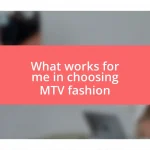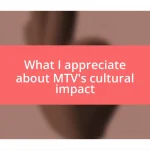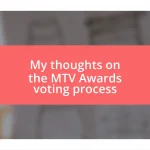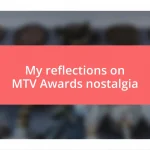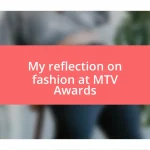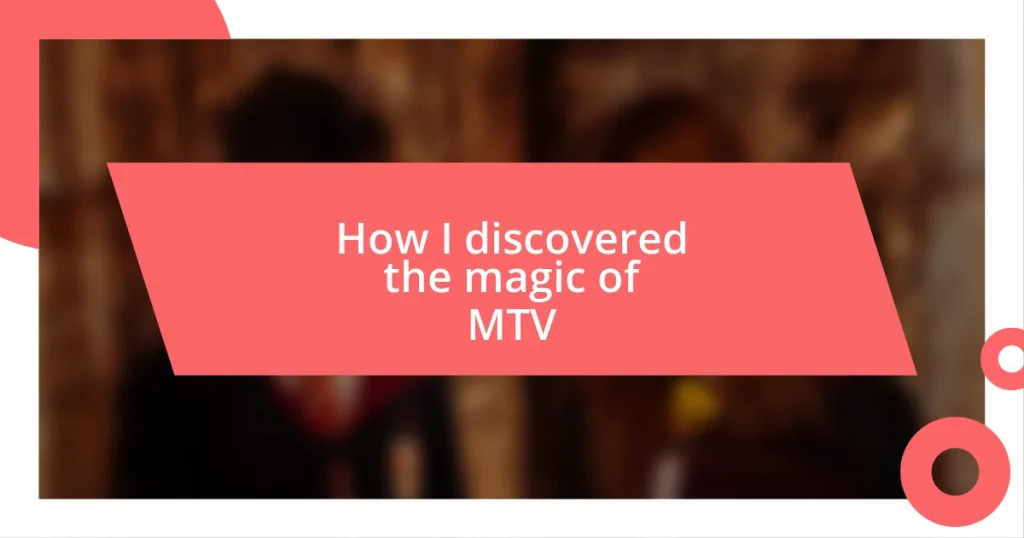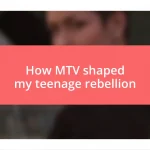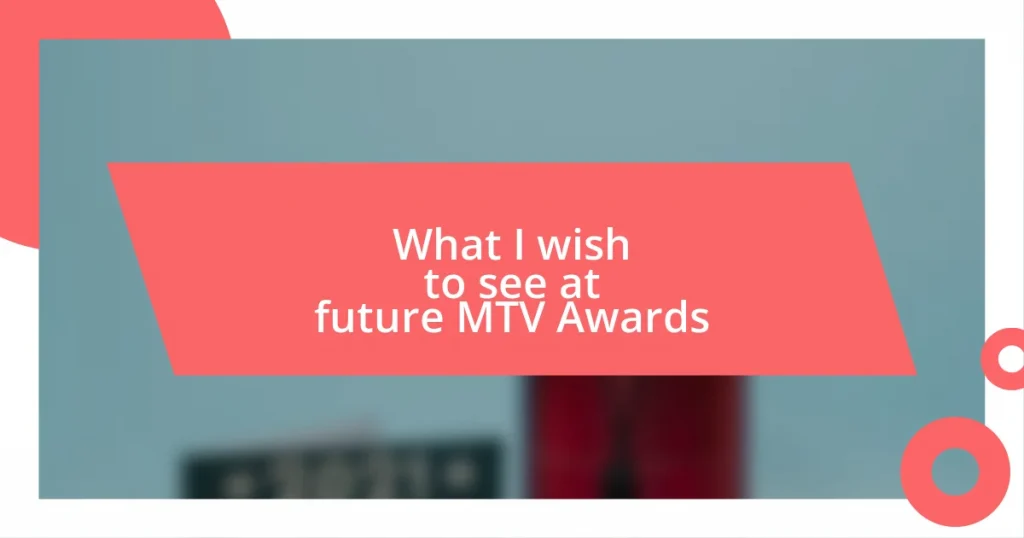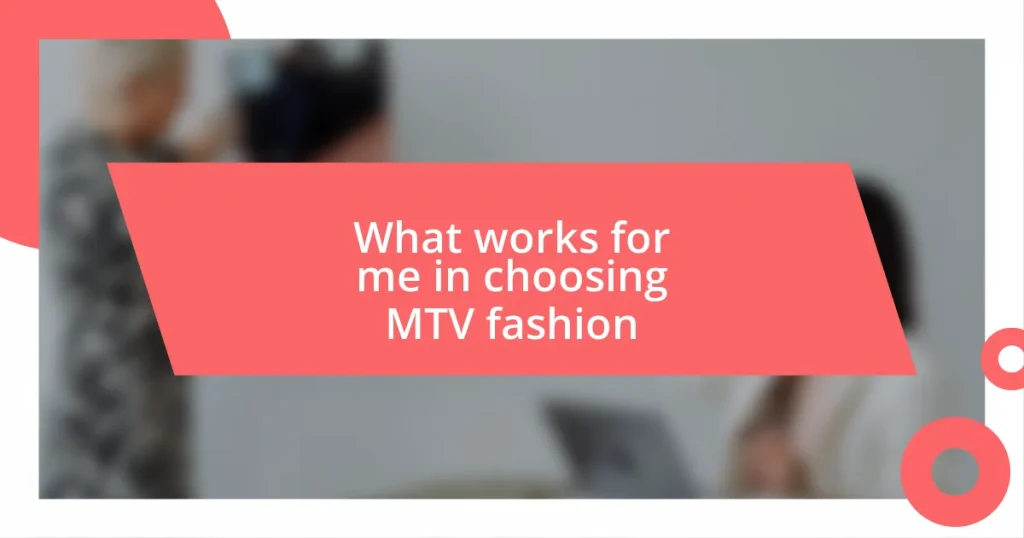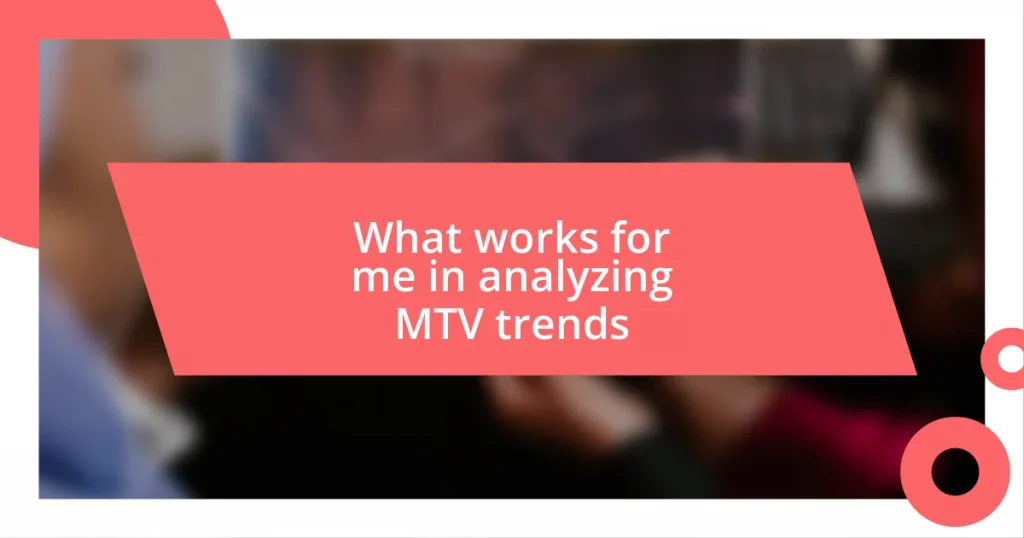Key takeaways:
- MTV transformed music consumption by combining visual storytelling with cultural commentary, impacting personal and societal perspectives.
- Key shows like “The Real World,” “TRL,” and “Beavis and Butt-Head” shaped viewer experiences, encouraging exploration of diverse lifestyles and community engagement.
- Iconic artists such as Madonna, Michael Jackson, and Nirvana influenced not just music but also fashion and social issues, fostering a sense of identity and empowerment among viewers.
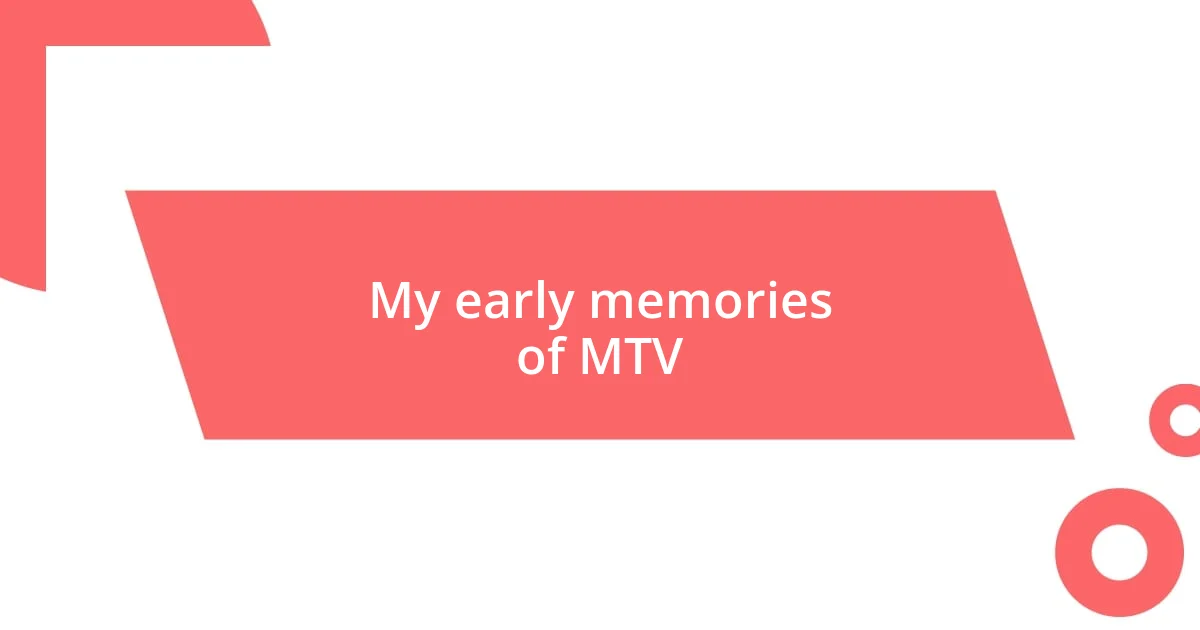
My early memories of MTV
I still remember the first time I stumbled upon MTV as a teenager, the screen flickering to life with bright colors and catchy beats. It felt like stepping into a vibrant world where music was more than just something to listen to; it was an experience that pulled me in. Was I alone in feeling an electric rush of excitement every time a new music video premiered?
Back in those days, I often watched MTV after school, sometimes bypassing homework just to catch a glimpse of my favorite artists. I think about how I would sit cross-legged on the floor, the television glowing in the dim light of my room, completely entranced by the visuals that paired perfectly with the music. The thrill of discovering a new band that resonated with my emotions felt almost magical—why did it feel like MTV was a gateway to something bigger than myself?
I still find it fascinating how those early MTV moments shaped my understanding of music and culture. Each video was not only a song but a statement, a glimpse into the artist’s world. Looking back, can I clearly say that those images and sounds fueled my passion for creativity? Absolutely—I can trace my love for storytelling in music videos back to those formative days with MTV, where I learned that art could transcend sound and paint powerful narratives.
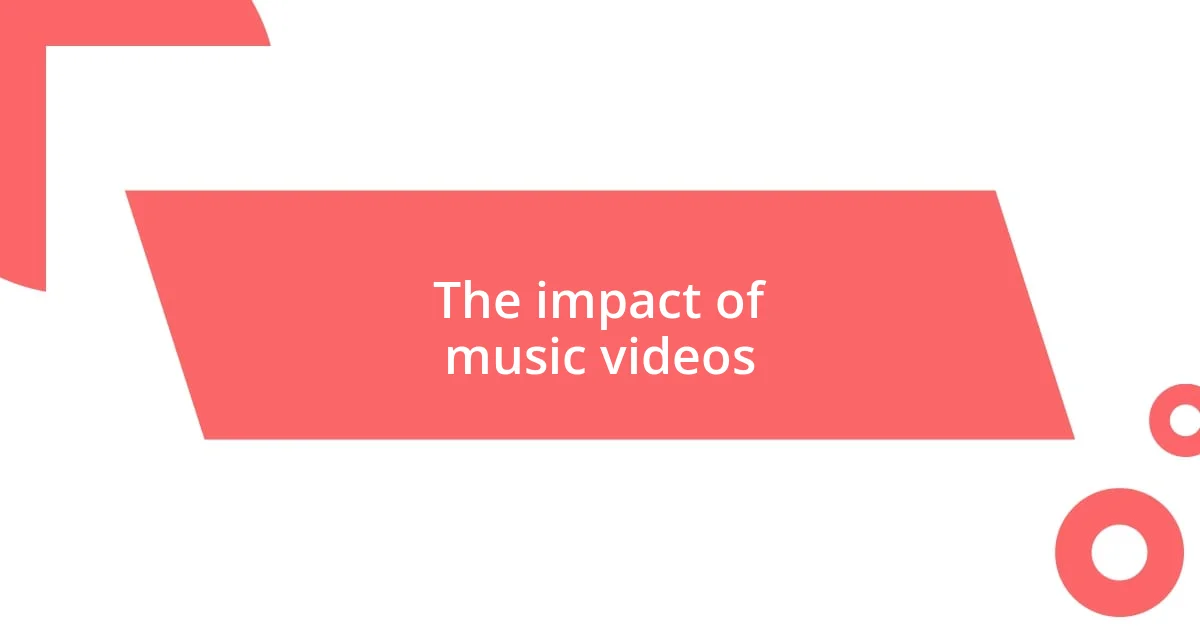
The impact of music videos
Music videos revolutionized the way we perceive music, transforming it from mere sound to a captivating visual story. I recall watching icons like Madonna and Michael Jackson, their videos combining striking imagery with thought-provoking themes. It wasn’t just entertainment; it was cultural commentary that deeply influenced my social understanding.
- Visual storytelling: Music videos convey complex narratives that can resonate on a personal level, influencing emotions and thoughts.
- Cultural impact: They often reflect or challenge societal norms, making viewers reconsider their perspectives.
- Artistic expression: Artists use music videos as a canvas, allowing them to showcase creativity beyond the audio experience.
I vividly remember the first time I saw Nirvana’s “Smells Like Teen Spirit.” It was like a jolt to my senses—raw energy, powerful messages, and a reflection of my own teenage angst. The video not only encapsulated a generation’s feelings but also inspired me to see how deeply music could connect with personal and societal issues. That’s when I realized the profound impact music videos could have, shaping my taste and even my identity in the music scene.

Key shows that shaped MTV
I remember the excitement as “The Real World” premiered on MTV. It was groundbreaking for its time, blending reality and drama into a series unlike anything else. Watching those strangers live together sparked my curiosity about different lifestyles and perspectives, making me reflect on my own experiences. It felt like stepping into a reality that was both foreign and familiar, prompting me to consider the complexity of human relationships and personal growth.
Then, “TRL” (Total Request Live) came along, and it was a phenomenon that transformed my after-school routine. I recall sprinting home to catch the countdown of the most requested music videos. It was more than just about the music; it was about community. Fans from all over the country were tuning in, and I felt a part of something larger, cheering for my favorites alongside thousands of others. This interactive platform changed the landscape of music promotion and created a genuine bond between fans and artists.
Finally, I can’t help but mention “Beavis and Butt-Head.” While it was often seen as irreverent comedy, it provided sharp commentary on the music videos of my youth. I remember laughing as they dissected the absurdities in the music scene, channeling my teenage angst into humor. It was a clever way of critiquing cultural phenomena while making me think about the messages behind the music. The show, in all its quirky charm, bridged laughter with insight, highlighting the way music can reflect and shape societal norms.
| Show | Impact |
|---|---|
| The Real World | Highlighted diverse perspectives and realities, inspiring viewers to explore human connections. |
| TRL | Created community engagement and interactivity between fans and artists, shaping music promotion. |
| Beavis and Butt-Head | Provided comedic critique of the music videos, prompting deeper reflection on cultural commentary. |
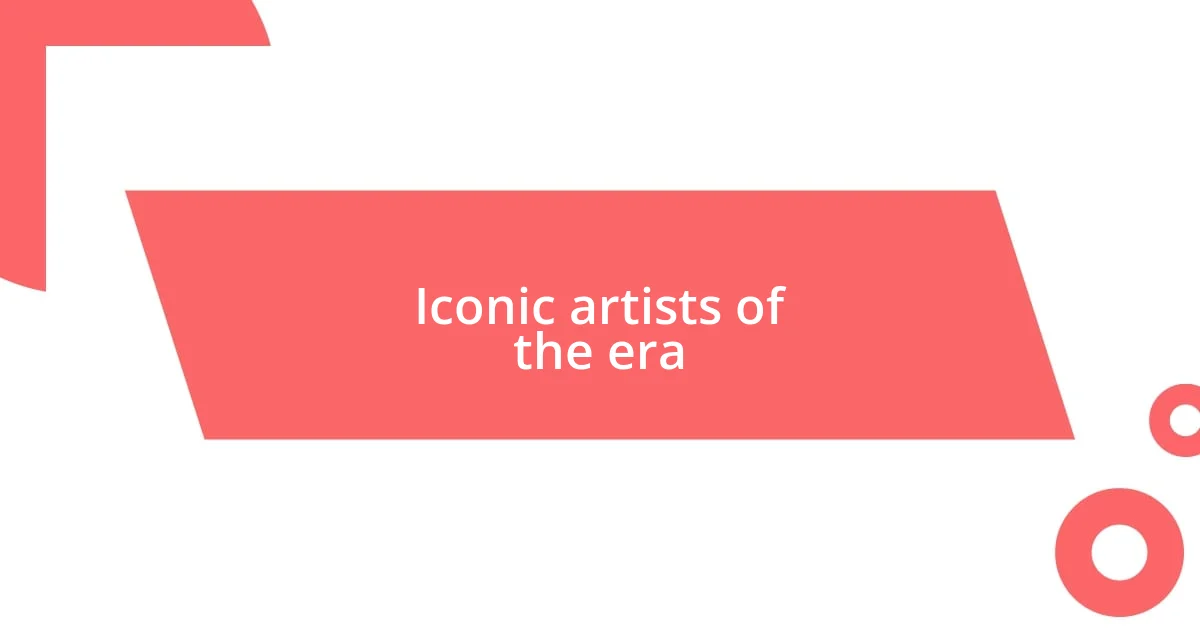
Iconic artists of the era
When I think of iconic artists from the MTV era, names like Madonna and Michael Jackson instantly come to mind. Their music and visuals were hypnotic. I still recall how I felt when I first saw Madonna in “Like a Prayer.” The mix of religion, race, and sexuality was edgy and bold, making me ponder social issues in ways I hadn’t before. Did anyone else feel how her music videos pushed boundaries?
As for Michael Jackson, he wasn’t just about the music; his videos like “Thriller” felt like mini-movies. I remember being captivated by the dance sequences and the storytelling. Who could forget the iconic zombie dance? It was a cultural moment that brought people together on the dance floor, thrilling us in ways that transcended mere listening. My friends and I would even attempt those dance moves at school—well, sort of!
Then there was Nirvana, whose raw authenticity broke conventions. Watching “Come As You Are” struck a chord deep within me. It was more than just grunge; it was an invitation to embrace imperfections. How amazing was it that an artist could channel the struggles of a generation through music? Their sound gave a voice to feelings I often struggled to articulate, making it feel like I wasn’t alone in my experiences.
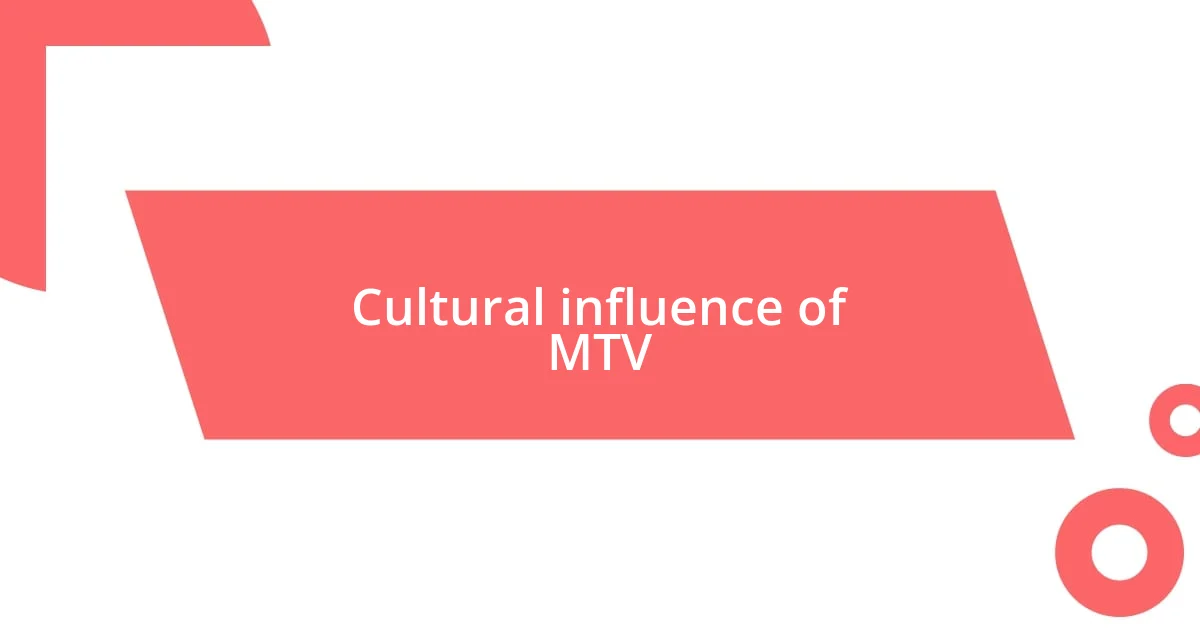
Cultural influence of MTV
MTV’s cultural influence reached far beyond music videos; it became a hub for emerging trends and a launchpad for social dialogue. I vividly recall being glued to the screen during award shows, especially the MTV Video Music Awards. The performances were electrifying, but what really got me thinking were the moments when artists spoke out about important issues. Watching them use their platform to advocate for change, I often wondered how their courage could inspire my generation to do the same. Did you feel that spark of rebellion too?
The introduction of diverse content meant that MTV was more than just entertainment; it shaped our cultural consciousness. Programs that showcased different lifestyles, like “Made,” encouraged me to explore my identity and aspirations. I can still remember feeling a surge of empowerment when I watched individuals transform and pursue their dreams. Those stories played a huge role in making the concept of self-discovery relatable. Does anyone else credit MTV for helping them find their way in the world?
Even the fashion trends set by MTV stars had a lasting impact on how we expressed ourselves. I reminisce about my teenage years, trying to emulate the bold styles of artists like Gwen Stefani and her signature Harajuku-inspired look. Those vibrant outfits weren’t just about fashion; they were a form of self-expression that resonated deeply with me. I often pondered how a single music video could define a season’s trends and influence our choices. MTV gave us permission to be unique, didn’t it?

Personal insights from MTV experiences
Looking back, one of my most vivid MTV experiences was discovering the music of The Cure through their video for “Just Like Heaven.” I still remember that ethereal, dreamlike quality. The way the visual storytelling intertwined with the lyrics felt like an exploration of young love and longing—a bittersweet emotion that stuck with me for years. Have you ever found a song so relatable that it resonated with your own experiences?
Another unforgettable moment was the world premiere of Britney Spears’ “…Baby One More Time.” I can almost feel the excitement buzzing in the air, as my friends and I rushed to gather around the TV. The schoolgirl outfit, the catchy hook—it felt like a cultural phenomenon. I remember how the video sparked countless conversations about image and empowerment. Did it make anyone else reflect on how we define confidence?
MTV wasn’t just a channel; it was a companion on my journey through adolescence. I often tuned in late at night for “120 Minutes,” where I discovered indie rock bands like Radiohead and the mesmerizing visuals in “Creep.” Those late-night sessions opened up a world of music that felt authentic and raw. It ignited in me a curiosity to seek out what lay beyond mainstream pop. Doesn’t it feel incredible to uncover hidden gems that become the soundtrack of your life?
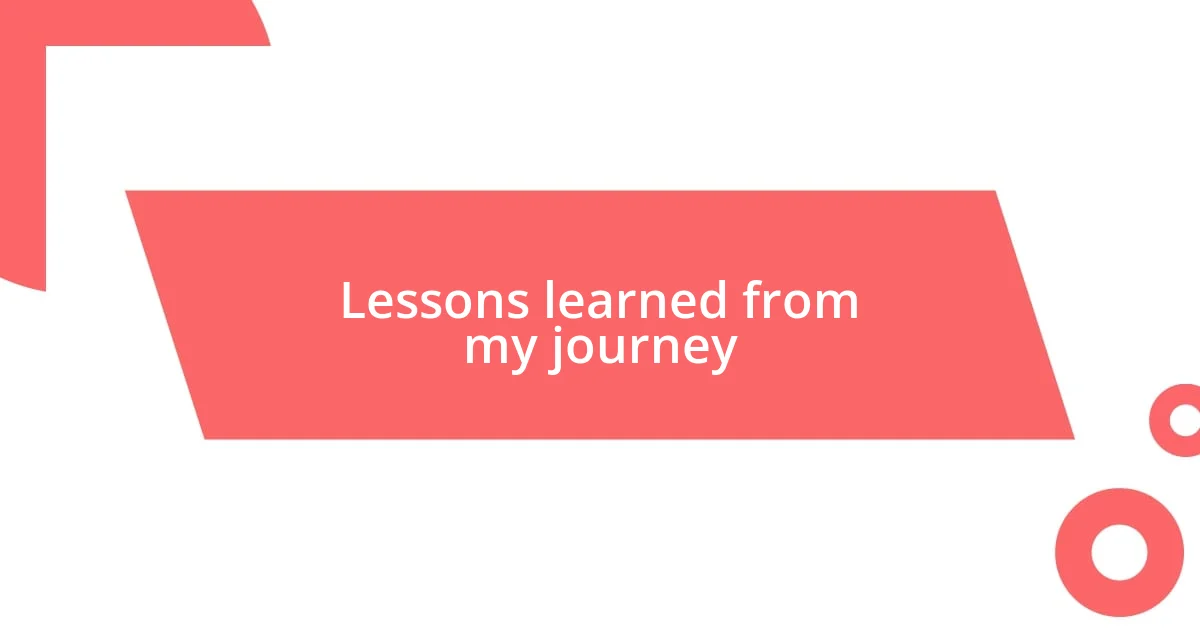
Lessons learned from my journey
Reflecting on my journey with MTV, I’ve learned the profound impact of music on identity. One night, I caught an episode of “The Real World,” and it opened my eyes to perspectives I hadn’t considered before. The different life stories shared on screen encouraged me to empathize with others—an essential lesson in understanding our diverse world. Has anyone else found that media can challenge our viewpoints and broaden our horizons?
Another lesson that stands out is the power of representation. I remember discovering artists like Missy Elliott, who broke barriers and redefined what it meant to be a female in hip-hop. Her confidence and creativity resonated with me deeply. It made me realize that seeing someone who looks like you achieve success can be incredibly validating. Did you ever feel inspired by an artist who mirrored your experiences or struggles?
Finally, my MTV experience taught me about the importance of optimism in the face of social issues. During an Artist of the Month spotlight on bands advocating for change, I felt an urge to be a part of something bigger than myself. They sparked an interest in activism that I carry to this day. How often do you think a moment in media can ignite a passion for advocacy? It’s fascinating to consider how our interactions with pop culture can lead us to become change-makers in our communities.

